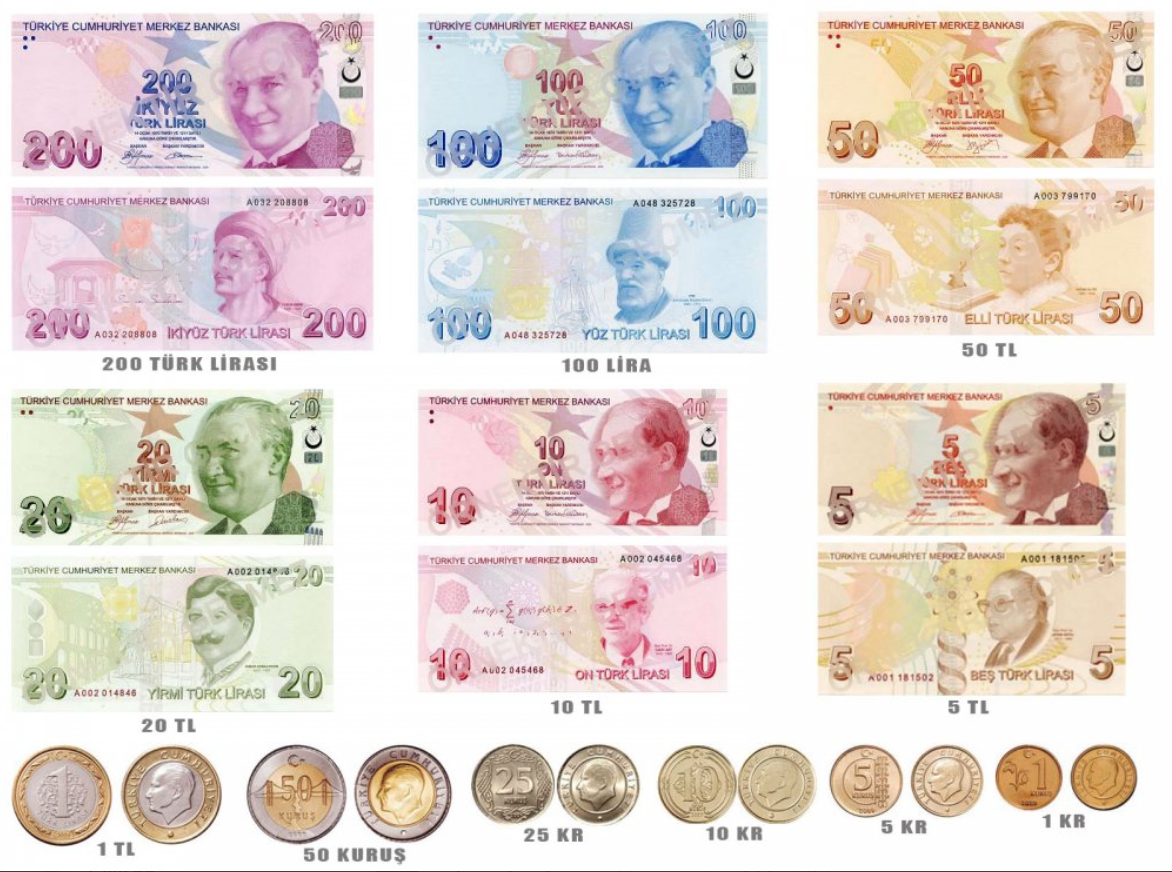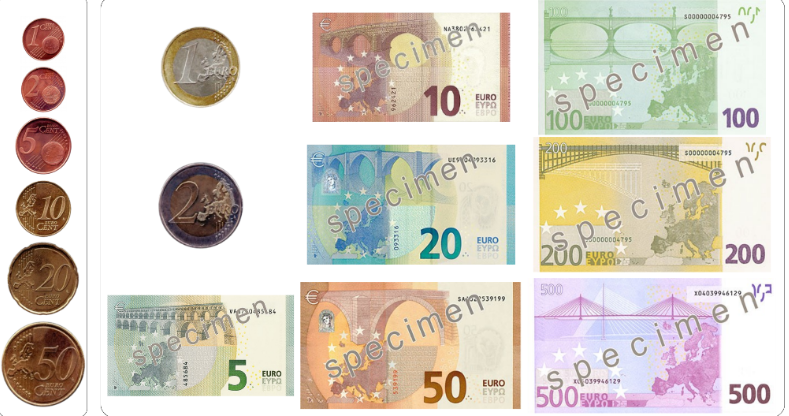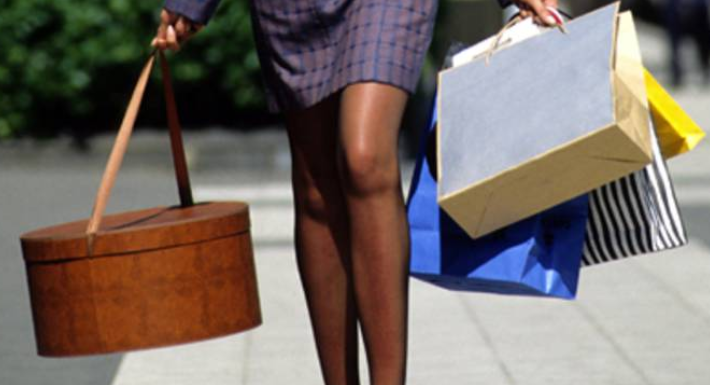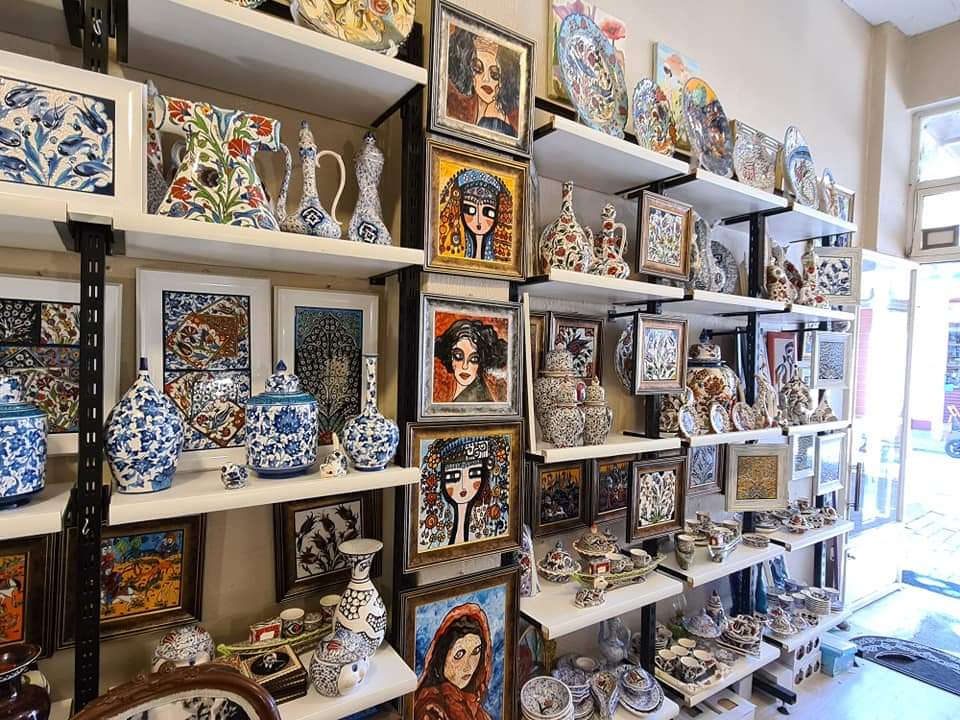MONEY & SHOPPING
The national currency is the Turkish lira. ( TL ) IMPORTANT : We have made this chapter to draw your attention to the similarity of coins and banknotes: The 0.5 TL and 1 TL coins look a lot like the 1 € and 2 € coins. 10 TL and 50 TL tickets are very similar to 10 and 50 € bills.....and Shopping.... More information in the description below and photos.
- Category: USEFUL INFORMATIONS TURKEY
- Service Length: 45 Minutes
- Price:Free
Description
MONEY
The euro exchange rate is sometimes very advantageous for tourists because the euro has multiplied by more than 9 lately ... (2020).The prices we indicate are indicative and may change with regard to economic hazards (exchange rate, inflation ...), periods (holidays, major weekends ...) and the rate of tourist attendance.
All international bank cards (Visa, American Express, Mastercard, etc.) are accepted by banks, hotels, restaurants and many shops, but rarely in markets and kiosks.
ATMs allow withdrawals in the street at any time. Some banks take a commission on all your withdrawals and payments. (Check with your bank)
Cash can be changed easily in exchange offices and in some banks. The rates are similar and cheaper than at the airport or hotel.
Store opening hours in Turkey are generally 9 a.m. to 8 p.m. and most shops are also open on Sundays. Shopping centers close at 10 p.m. Turkish grocery stores called "bakkal" close around midnight and some are open 24 hours a day. Grocery stores that sell alcohol are branded "Tekel". Normally the sale of alcohol is prohibited in grocery stores after 10 p.m. but rare are those that apply the law. The cafes and restaurants are open until around midnight but it is always possible to find a place to eat or drink at any time. The bars are open until 2am on weekdays and 4am on weekends, you will also find many nightclubs and cabarets open all night across the country.

Turkey is a famous shopping destination for all it offers in terms of merchandise choices and unbeatable prices. You can find absolutely everything there, from international brands to local productions, including bazaars with bewitching colors and flavors.
The biggest bazaar in the world? Look no further, this is Turkey in Istanbul, a center of trade between East and West for millennia. But in Istanbul it's not just the Grand Bazaar. Other bazaars have made their reputation by offering special products, such as the Egyptian bazaar, a paradise for spices from all over the world.
The bazaars are an experience in themselves. A journey through time and the countless labyrinths of covered corridors offering unparalleled smells, flavors and colors. Also, and even if you are the type who prefers to shop in modern malls, you cannot visit Istanbul without getting lost in one of its bazaars ...

SHOPPİNG
WHAT TO BUY IN TURKEY?
Turkey is a true shopper's paradise. You can find everything there, food, textiles, leather goods, jewelry, spices, souvenirs, antiques, works of art ... really EVERYTHING! And that’s no accident at all. The country has long been the gateway to the East and one of the largest trading centers at the crossroads of the Silk Roads.
You will find there the wonders of the East, India and China, passing through Persia, as well as goods from the West.
The flagship products and very good qualities are:
- Textiles and shoes
- Leather objects and clothing
- Jewelry and gold
- The rugs
Shopping Tips in Turkey
It is impossible to think a holiday without the thrill of shopping. This is a part of a great vacation. Shopping in Turkey is irresistible for the wide range of unique and beautiful crafts available here. Once you see the variety of products with this "very different" and unique Turkish style, you will want to take some home to share with your friends and family.
Shopping in Turkey is both entertaining and satisfying. You gain in terms of experience along with possessing some of the most prized items in the world.
Tips For Shopping in Turkey
• If you plan a major purchase, it is recommended in the factories that the goods are made in.
• Shopping in Turkey is best done in the morning when the salesmen have more time. Try to be one of the first customers because Turkish shopkeepers believe that the first customer is sent by their Gods and pleasing him or her brings good luck throughout the day. That’s why you can buy the items with beter price.
• Bargaining is one of the shopping tips in Turkeya. Bargaining except food, drinks and service are quite customary in Turkey. Most of the shopkeepers know you may bargain. If you are interested in something, ask the shopkeepers for a discount, be sure they will do it.
• Shopkeepers in Turkey are largely honest and will not sell the imitations as the original, but it is always good to ask for a certificate of guarantee for expensive items like carpets or jewelry.
• Making the payment, you should know the rate of exchange that applies. Ask for a calculator and work out the amount in your own currency.
• When buying silver or gold, be sure to look for the maker's hallmark stamped into an inconspicuous part of the piece, certifying that it is genuine.
• Most of the credit cards like VISA, Mastercard, Amex and Dinners Club and traveler's checks are accepted in almost all the shops. However, make sure to ask before you purchase a product or service. You will get a lower price on most of the goods when paid by cash for two reasons: 1. Shops pay 7 % commission on credit card sales to banks 2. Tax
• In the tourist regions most prices are advirtesed in Euro and US Dollars. But change offices are also widely avaible to change your money. The rates of currency are lower than in the hotels and banks. So a change Office would be in your favour.

Bargaining in Turkey
Bargaining is a traditional way of shopping for Turkish people, so before you buy something, it is necessary not to hesitate for bargaining. Before buying more expensive items, such as jewellery or carpets, you should also consider comparing prices with each other in addition to bargaining. Please, do not forget that is not appropriate to bargain in nation-wide supermarkets,restaurants or branded stores in shopping centers.
What Can Be Bought in Turkey?
Turkey, as a result of its geographical location, is a treasure-house of hand-made products. These range from carpets and kilims, to gold and silver jewelry, ceramics, leather and suede clothing, ornaments fashioned from alabaster, onyx, copper, and meerschaum.
When purchasing carpets, jewelry or leather products, it is advisable to consult your guide or do your shopping at a reputable store rather than in the street from vendors.
Carpet
Your trip to Turkey is incomplete if you do not come home with a Turkish carpet as a keepsake. Most of the tourists coming to Turkey return to their homes with carpets because Turkey is a treasure-house of carpets. Turkish carpets are either knotted or flat woven. It is a form of craft prevalent in Turkey since ancient times. Originally woven as utility items, they soon became known for their beauty and durability. A Turkish carpet is a rare piece of art that will decorate your house as well as bring a slice of Anatolian tradition into your drawing room. Today they are the most popular shopping item for foreigners. It is accepted that handmade Turkish carpets are the strongest carpets in world and can be used generations to generations. Also Turkey is one of the most famous carpet weaving centers in the world. Therefore, Turkey is a great place to go if you are shopping for carpets to decorate your home abroad or your second home in Turkey.
Since a carpet is more of a work of art, the deeper meanings of each design cannot be neglected. A carpet can be likened to a poem; neither can tolerate any extra element which does not contribute to its wholeness and value. Therefore, just like in a poem, each pattern of a carpet is chosen for its beauty and motifs are carefully arranged to form rhymes.
Turkish carpets carry a wide range of symbols. For many centuries, Anatolian women have been expressing their wishes, fears, interests, fidelity and love through the artistic medium of carpets. Even so, there are typical repeated motifs changing from region to region; geometric designs, tree of life, the central medallion design, the prayer niches in prayer rugs, etc.
Leather
Turkey sells lots of great leather apparel, including suede garments. Turkish cuisine is based on lamb and mutton, which means there are lots of soft skins from which to make fine leather clothing and accessories.
In fact, some of the finest leather items manufactured in Turkey often find their way to shops in Italy. Premium grade leather is selected. This is then designed by fine craftsmanship into beautiful leather goods that speak of style and elegance.Among these products that people demand are leather jackets, shoes and belts, all produced in Turkey using traditional methods. If you want to go shopping for a leather in Turkey then a leather wallet or purse is always a good option for a souvenir. Tourists like shopping for leather products in Turkey because it is known that quality and workmanship of leather products are of a high standart.
When purchasing leather goods, one should be aware of the very wide range of products; different animal skins, baby lamb, lamb, suede, nubuk, pelluria, etc. and their differing qualities and prices.
Jewellery and Silver
An exquisite piece of gold and silver jewelry, with or without stone setting, is something you should look for. Surprisingly, although the prices of gold and silver are fixed internationally, jewelry items in Turkey are cheaper than in other places. This is due to the low labor cost. A wide variety in design is available to meet the demands of various tastes. The craftsmanship is usually good, but you must inspect each piece to pick the best.
It is also possible to design your own jewellery and have it handmade for you with a reasonable price in most big jewellery centers located everyside of Turkey. If you should be short in time, these centers can send your customized jewellery with insurance to your home address abroad.
Textiles
Products of the natural raw materials cotton are traditionally sold in the shops of Turkey. Cotton is cultivated everywhere in Turkey, so that Turkey is in fact third biggest producer of cotton in the world. If you travel inland of Turkey, you can see many cotton fields. Most of the textile fabrics are located around Denizli ( Pamukkale ) because of here’s high quality cottons.

Ceramics and Handcrafts
Turkey has been famous for excellent faience (colored tilework) since the 16th century, are still making excellent plates, bowls, cups, tiles and other items in the traditional way. They're sold all over Turkey for prices from a few Euro to several hundred, depending on the item and its quality.
Genuine Fake Watches
Genuine fake watches - they are really advertised like that and its always amazing how "genuine" these copies are looking. So why not bring your boss one "Rolex" home and say this is your "THANK YOU" for the last holiday.
Waterpipe / The Nargile
To smoke a waterpipe it's a real ceremony. The Nargile, as this Turkish pipe is called often find up to four man sitting around and using the same pipe. Tobacco, or better only the best leafes of tobacco are laid on the pipe and then topped with a piece of hot charcoal. The water in the pipe cools it down and absorbs the nicotine very well.
Boncuk / Evil Eye
There is one typical item, an equity of this region you should take home as a souvenier, it's called the Boncuk, the Little Magic Stone that protects one from the *Evil Eye* turkish=boncuk (pronounced 'bon-dschuk'), you will see this blue glass piece everywhere here in Turkey. Evil eye is a look that is superstitiously believed by Turkish people to be able to cause injury or bad luck on the person at whom it is directed for reasons of envy or dislike. The term also refers to the power attributed to certain persons, of inflicting injury or bad luck by such an envious or ill wishing look.
